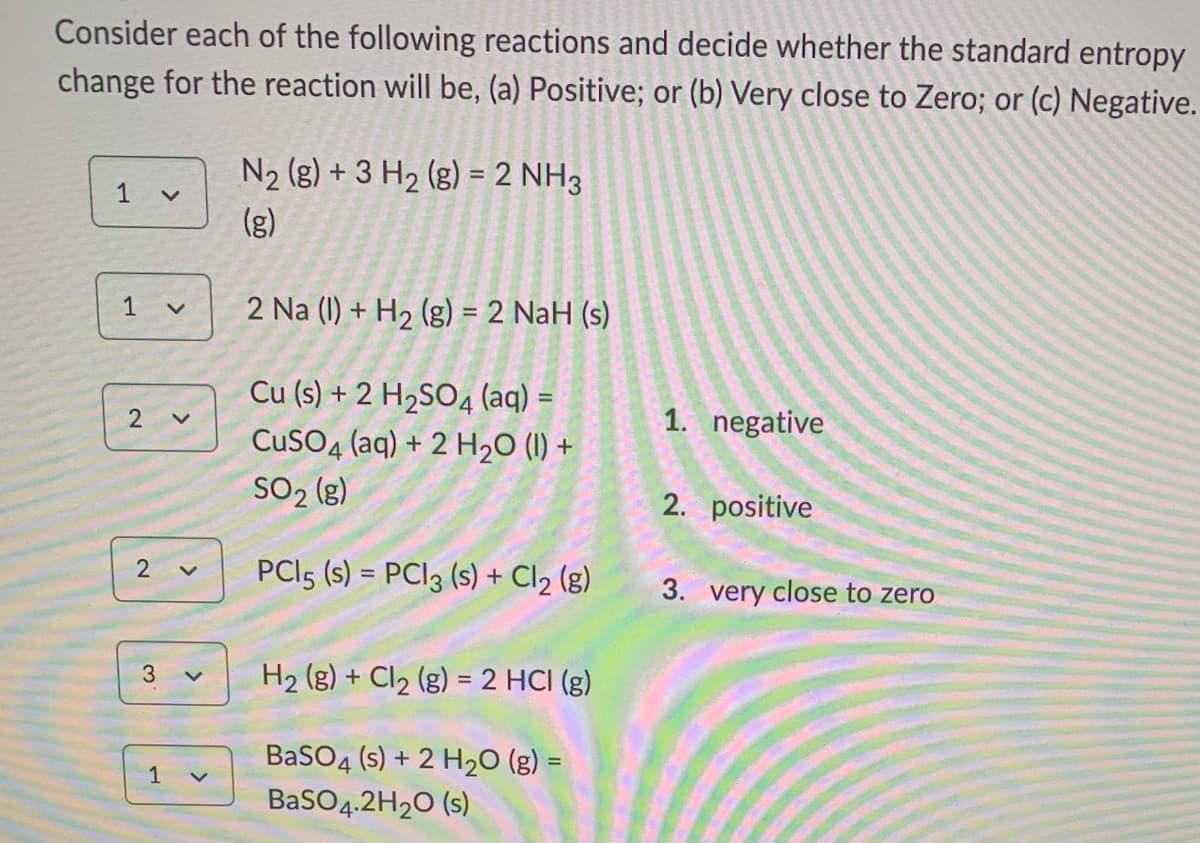Consider each of the following reactions and decide whether the standard entropy change for the reaction will be, (a) Positive; or (b) Very close to Zero; or (c) Negative. N2 (g) + 3 H2 (g) = 2 NH3 1 (g) 1 2 Na (1) + H2 (g) = 2 NaH (s) %3D Cu (s) + 2 H2SO4 (aq) = 1. negative CuSO4 (aq) + 2 H2O (I) + SO2 (g) 2. positive PCI5 (s) = PCI3 (s) + Cl2 (g) %3D 3. very close to zero H2 (g) + Cl2 (g) = 2 HCI (g) %3D BaSO4 (s) + 2 H20 (g) = BaSO4.2H20 (s) 1 2. 2.
Consider each of the following reactions and decide whether the standard entropy change for the reaction will be, (a) Positive; or (b) Very close to Zero; or (c) Negative. N2 (g) + 3 H2 (g) = 2 NH3 1 (g) 1 2 Na (1) + H2 (g) = 2 NaH (s) %3D Cu (s) + 2 H2SO4 (aq) = 1. negative CuSO4 (aq) + 2 H2O (I) + SO2 (g) 2. positive PCI5 (s) = PCI3 (s) + Cl2 (g) %3D 3. very close to zero H2 (g) + Cl2 (g) = 2 HCI (g) %3D BaSO4 (s) + 2 H20 (g) = BaSO4.2H20 (s) 1 2. 2.
Chemistry & Chemical Reactivity
9th Edition
ISBN:9781133949640
Author:John C. Kotz, Paul M. Treichel, John Townsend, David Treichel
Publisher:John C. Kotz, Paul M. Treichel, John Townsend, David Treichel
Chapter18: Principles Of Chemical Reactivity: Entropy And Free Energy
Section18.4: Entropy Measurement And Values
Problem 1RC: Without looking up their standard entropies in reference tables, identify which of the following...
Related questions
Question

Transcribed Image Text:Consider each of the following reactions and decide whether the standard entropy
change for the reaction will be, (a) Positive; or (b) Very close to Zero; or (c) Negative.
N2 (g) + 3 H2 (g) = 2 NH3
%3D
1
(g)
1
2 Na (I) + H2 (g) = 2 NaH (s)
%3D
Cu (s) + 2 H2SO4 (aq) =
CuSO4 (aq) + 2 H2O (1) +
SO2 (g)
2
1. negative
2. positive
PCI5 (s) = PCI3 (s) + Cl2 (g)
%3D
3. very close to zero
H2 (g) + Cl2 (g) = 2 HCI (g)
%3D
BaSO4 (s) + 2 H2O (g) =
1
BaSO4.2H20 (s)
3.
Expert Solution
This question has been solved!
Explore an expertly crafted, step-by-step solution for a thorough understanding of key concepts.
Step by step
Solved in 2 steps with 2 images

Knowledge Booster
Learn more about
Need a deep-dive on the concept behind this application? Look no further. Learn more about this topic, chemistry and related others by exploring similar questions and additional content below.Recommended textbooks for you

Chemistry & Chemical Reactivity
Chemistry
ISBN:
9781133949640
Author:
John C. Kotz, Paul M. Treichel, John Townsend, David Treichel
Publisher:
Cengage Learning

Chemistry: The Molecular Science
Chemistry
ISBN:
9781285199047
Author:
John W. Moore, Conrad L. Stanitski
Publisher:
Cengage Learning

Physical Chemistry
Chemistry
ISBN:
9781133958437
Author:
Ball, David W. (david Warren), BAER, Tomas
Publisher:
Wadsworth Cengage Learning,

Chemistry & Chemical Reactivity
Chemistry
ISBN:
9781133949640
Author:
John C. Kotz, Paul M. Treichel, John Townsend, David Treichel
Publisher:
Cengage Learning

Chemistry: The Molecular Science
Chemistry
ISBN:
9781285199047
Author:
John W. Moore, Conrad L. Stanitski
Publisher:
Cengage Learning

Physical Chemistry
Chemistry
ISBN:
9781133958437
Author:
Ball, David W. (david Warren), BAER, Tomas
Publisher:
Wadsworth Cengage Learning,

Chemistry: Principles and Practice
Chemistry
ISBN:
9780534420123
Author:
Daniel L. Reger, Scott R. Goode, David W. Ball, Edward Mercer
Publisher:
Cengage Learning

Chemistry: An Atoms First Approach
Chemistry
ISBN:
9781305079243
Author:
Steven S. Zumdahl, Susan A. Zumdahl
Publisher:
Cengage Learning
